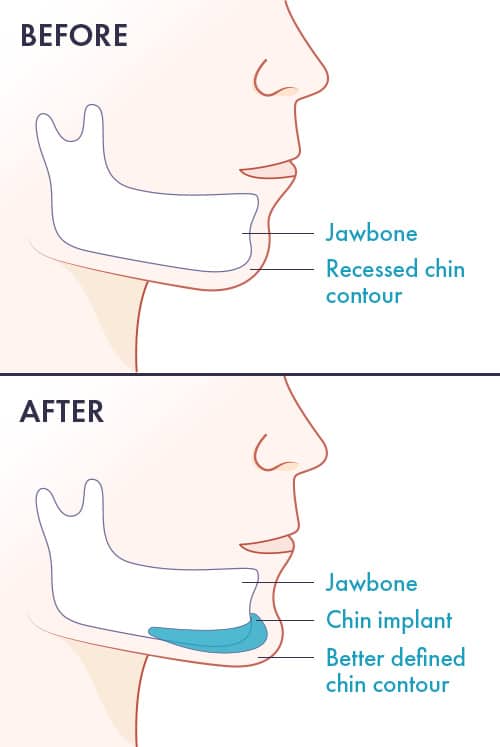Chin surgery also known as genioplasty is a surgical procedure carried out to improve the appearance of the chin. It involves the enhancement of the chin with surgical implants or reduction surgery on the bone to augment the size and shape of the chin and achieve a more naturally attractive balance between facial features.
Many times a plastic surgeon may recommend a rhinoplasty (nose job) procedure to a patient having chin surgery to achieve better facial proportions, as the size of the chin may magnify or minimize the perceived size of the nose.
The procedure is mainly carried out for cosmetics purposes and so can be performed by a plastic surgeon or an oral and maxillofacial surgeon.
Types of Chin Surgery

chin surgery
There are different types of chin surgery depending on the model and format of the procedure. They include:
Sliding genioplasty surgery – This uses the lower prominence of the mandible as the implant. The procedure involves cutting a horseshoe-shaped piece of bone from the lower border of the mandible known as an osteotomy. For chin surgery, the piece of bone is advanced to increase the projection of the chin.
This procedure can take place in a hospital or an office operating room. Most have general anesthesia for the procedure.
Chin implant surgery – Here, the surgeon will cut the mouth with an appropriate implant to be inserted in. Some common types of chin implant materials include silicone, Gore-tex, and more.
Once the material is implanted, the surgeon stitches up the incision. This procedure can take anywhere from 30 minutes to three hours.
Chin surgery risks and complications
Like all surgical procedures, chin surgery has its risks and complications. They include:
- Swelling – This is a relatively minor complication and often resolves on its own.
- Hematoma – Blood or bleeding under the skin. Typically black and blue at first, with color changes as healing progresses.
- Weakness or numbness of the lower lip due to damage to the mandibular nerve.
- Infection – Use of donated bone implants in chin augmentation, even the patient’s own, appears to be associated with a higher rate of infection, even after the implant has been in place for decades.
- Displacement of the implant
To reduce the risks of complications, it is advisable to use an experienced surgeon, and chewing should be kept at a minimum immediately after chin surgery.
More: Lipoma Removal Cost
Chin Surgery Recovery
Most chin surgery patients experience relatively little downtime and are back to desk work and most other daily activities within 7 days after surgery. Discomfort is typically minimal and easily controlled with pain medication or cold compresses.
You will need to sleep face-up, with your head elevated, for a minimum of 1 to 2 weeks after surgery to help control post-op swelling and protect your healing incisions. Your cosmetic surgeon may also require you to consume a liquid-only diet for a day or two after surgery. Strenuous activity can typically be resumed within 3 to 4 weeks after chin augmentation. It is important to follow your cosmetic surgeon’s specific instructions during recovery to ensure you heal well and your results look great as soon as possible.
Results look close to final within one month after surgery and are considered final after about 3 months when residual swelling has subsided.
Chin Surgery Cost
The total cost for chin surgery depends on a lot of factors such as the anesthetic fee, private hospital fee, private operating facility fee, the extent of surgery required. The total cost of the procedure is around $1500 – $5500.
As stated earlier, chin surgery is usually carried out for cosmetics purposes and as such most health insurance plans do not cover chin surgery or its complications, but many plastic surgeons offer patient financing plans, so be sure to ask.
More: Jaw Reduction Surgery


